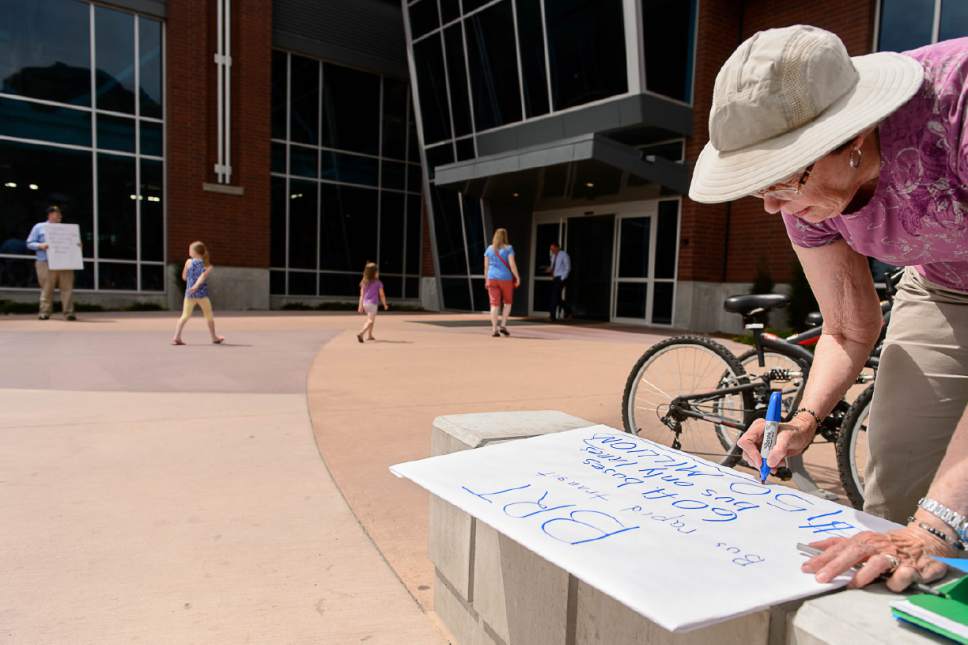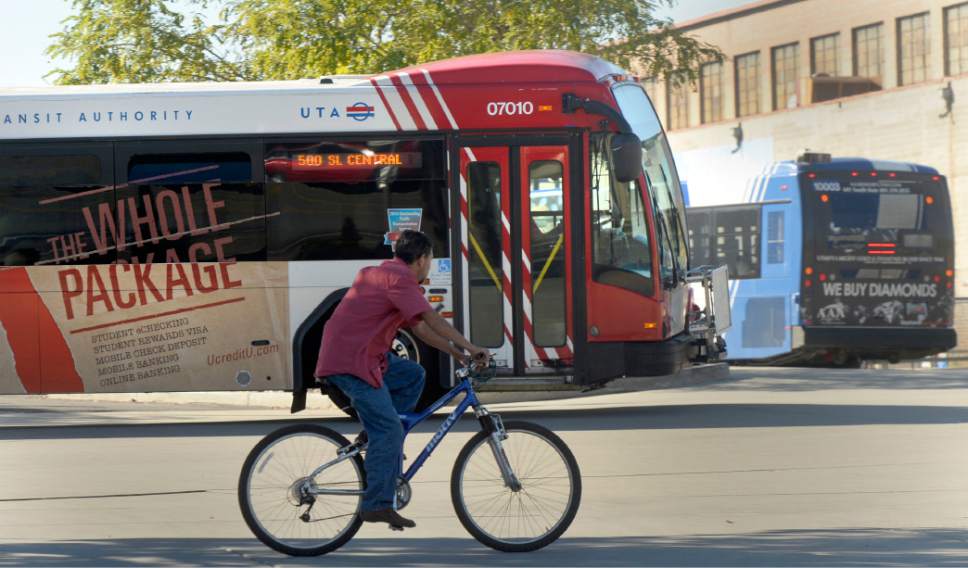This is an archived article that was published on sltrib.com in 2016, and information in the article may be outdated. It is provided only for personal research purposes and may not be reprinted.
A group trying to thwart a proposed "bus rapid transit" project in Provo and Orem says the Utah Transit Authority is stalling, demanding exorbitant fees and making unreasonable requirements in an open-records request one of its members filed.
UTA's tactics are hampering the effort to obtain information sought for upcoming arguments before the Utah Supreme Court over forcing a referendum vote on the project, the group says. UTA counters that it is responding to the request in "a timely fashion and in compliance with state law."
Diane Christensen is one of the people suing the cities to try to force a referendum vote.
"It looks very much to me as if they are stonewalling," Christensen says.
She filed an open-records request seeking all correspondence about the bus rapid transit, or BRT, project in the past year between UTA and the Federal Transit Administration. Christensen suspects such emails could raise doubts about UTA assertions that the project may proceed no matter what happens with the referendum.
She said she contacted UTA last week after she believed the deadline for its reply had passed. She then received a letter saying that a cursory search by the agency showed that more than 1,000 requested emails exist, some of which have attachments that are each more than 50 pages long.
UTA wrote that it would not begin to process the request unless Christensen paid a deposit of $500. She was also told that the "actual cost will be much higher," but was not given a specific amount. She tried to narrow the request to just over five months' worth of emails, but was still told the cost would be more than $500.
That led Christensen to complain to The Salt Lake Tribune.
"They tell me I'd be responsible for the final costs, but don't quantify what those would be — just 'much higher than $500,' " she said. "What kind of idiot would I have to be to agree to that?"
Christensen adds, "They've fulfilled the letter of the law by telling me there's a mechanism by which I can receive the information I need, but then they've set the mechanism such that nobody in their right mind would use it."
She has filed similar open-record requests in the past with other government agencies, she said, and was never charged more than $10 for electronic copies of emails on a flash drive or disks.
She adds that UTA has not said how long it would take to provide the information requested. So, Christensen says, "What else can I conclude but that they're hiding information?"
When asked for a response, UTA spokesman Remi Barron said in an email, "UTA receives a lot of GRAMA [Government Records Access and Management Act] requests, and the agency responds to all in a timely fashion and in compliance with state law. The agency has adopted a fee schedule as permitted by statute and charges to segregate and produce records, especially in cases like this, where the scope of the request is extremely large."
Christensen said her group would like to see the emails and information in them before it makes verbal arguments before the Supreme Court on Oct. 14.
The case revolves around a dispute about whether street leases approved by Orem and Provo city councils to facilitate the BRT are subject to voter referendum. The Utah Constitution allows referendums to force elections on whether to overturn new ordinances passed by cities. But Provo and Orem say the leases were administrative actions not subject to voter rejection. UTA, meanwhile, has approved starting construction on the project.
The $150 million bus rapid transit line would run extra-long buses on special lanes for about half their 10.5-mile Provo-Orem route. Passengers would buy tickets from machines before boarding buses featuring extra doors to speed entry. Buses may receive priority at signals and would come every six minutes at peak times.
Besides running on city roads affected by the contested leases, BRT would operate on major state highways, such as University Parkway and University Avenue. It would run between FrontRunner stations in Provo and Orem via Utah Valley University, University Mall, Brigham Young University, downtown Provo and the Provo Towne Centre mall.
UTA has been involved in some other open-record request controversies in the past week.
It delayed responses last week both to The Tribune and Teamsters Local 222 about how much it may be spending in efforts to persuade 44 TRAX supervisors to vote against union organizing in an election being held Monday and Tuesday.
Also a former UTA planner, J. Michael Clara, lost most of his case last week before the State Records Committee, seeking to waive the cost for records he says he cannot afford, but which he believes would show that the agency fired him because he warned it was violating safety laws. UTA denies the allegation.
This story has been changed from the original to reflect that the anti-BRT group is suing Provo and Orem cities rather than the UTA.





